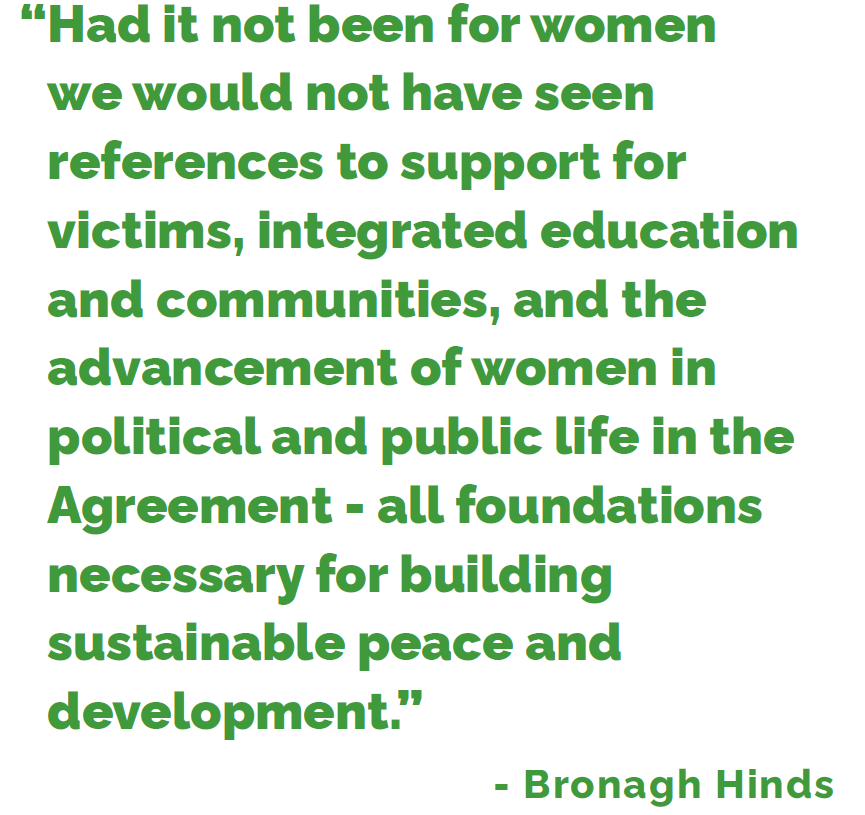Northern Ireland Women’s Coalition
Women had been involved in the peace process in Northern Ireland since the beginning, but in early 1996, Monica McWilliams and Avila Kilmurray discussed the upcoming peace talks and lamented the fact that due to the lack of women in politics, women’s voices would not be heard or considered by the politicians negotiating plans for Northern Ireland’s future. Working closely with the Northern Ireland Women’s European Platform – a group that campaigned for women’s equal civic and political rights – they began lobbying the Northern Ireland Office for a gender-proofed party list system by which men and women were alternated in equal proportions on their lists. They also sought funds for non-party organisations to be included in the peace talks, as it was widely acknowledged that women were particularly active in community-based groups and their voices and experiences would be of value. Their proposals were largely ignored by the British Government.
From the Northern Ireland Women’s Coalition archive at the Linen Hall Library
At a meeting on 17 April 1996 which was attended by representatives of up to 200 women’s groups, it was decided to lobby the government to allow a women’s network to be included in the talks. Much to their surprise, the government agreed to allow it, and the Northern Ireland Women’s Coalition (NIWC) was formed, making equality, human rights, and inclusion their main principles. They had just six weeks to mount a campaign and three weeks to choose candidates to put forward. The NIWC quickly set about looking for candidates and encouraged the inclusion of women from varying communities and identities by refusing to take a stance on the constitutional question of whether Northern Ireland should remain in the UK or become part of a united Ireland. While they managed to field 70 candidates from both nationalist and unionist backgrounds, from working- and upper-class communities, they were met with some hostility by mainly Unionist politicians. Despite everything, after just six weeks of existence, the NIWC secured two seats for the All-Party Talks which began on 10 June 1996 and the only women at the table were the two elected to represent the NIWC – Monica McWilliams and Pearl Sagar.
From left, Delia Close, June Morrice, Monica McWilliams, May Blood and Pearl Sagar at the Northern Ireland Women’s Coalition conference in Cookstown, Co Tyrone in 1998. Photograph Paddy Whelan
The NIWC argued that the talks should be about more than just the constitutional question. They reasoned that ‘…one of the principles should be a willingness to transform and radicalise the democracy, to include and involve people…’[1] Regarding the Agreement itself, they stated that it:
should be underscored by principles of inclusion, equality, and human rights, and be capable of winning the allegiance of all citizens […] it should broaden and deepen the democracy, drawing on the best lessons of partnership, cooperation, and collaboration - people and politicians working together constructively to govern themselves. The agreement should also go beyond the narrow confines of two traditions.[2]
It was the NIWC’s view that an important part of securing a lasting peace would require an inclusive Agreement with input and approval from all parties. It was for this reason that they were strongly against the expulsion of the loyalist Ulster Defence Party (UDP), and subsequently the exclusion of the republican Sinn Féin, when violence carried out by the UDA and IRA occurred in breach of the ceasefire. The NIWC maintained that if a group was not given the opportunity to have their views heard and included, it would be ‘… much less likely that they would sign up to the outcome, let alone support any eventual agreement.’[3]
Members of the Northern Ireland Women's Coalition at a press conference at Castle Buildings following the signing of the Good Friday Agreement, 10 April 1998 (image by Derek Speirs)
Both Monica and Pearl faced serious sexism and ridicule in the Forum for Dialogue and Understanding which ran alongside the peace talks. They were called ‘silly women’ and told that they should be at home ‘breeding children for Ulster.’ Ian Paisley infamously made mooing noises when Monica stood to speak. In spite of this, Monica and Pearl – on behalf of the NIWC - secured very important aspects to the peace agreement, integrated education, restitution for victims and a civic forum rather than just a concentration on decommissioning and disarmament. These aspects were key to the success of the Belfast/Good Friday Agreement, which was signed on 10 April 1998, and passed when 72% of the general public voted in its favour (thanks in no small part to the efforts of the NIWC).
The legacy of the NIWC goes beyond what it secured during the peace talks, it also ‘contributed to de-mystifying the political process’, particularly for women. It proved that ‘civil society can participate in and influence formal political negotiations’ and that those outside the spheres of strictly nationalist or unionist circles could have a seat at the table.
Bibliography:
Fearon, Kate, Women’s Work: the story of the Northern Ireland Women’s Coalition, Belfast (1999), pp. 51, 121.
Fearon, Kate, ‘Northern Ireland’s Women’s Coalition: Institutionalising a political voice and ensuring representation,’ online at: https://www.c-r.org/accord/public-participation/northern-irelands-womens-coalition-institutionalising-political-voice [accessed 8 Feb. 2022].
Fearon, Kate and McWilliams, Monica, ‘Swimming against the mainstream: The Northern Ireland Women’s Coalition,’ in Carmel Roulston and Celia Davies (eds), Gender Democracy and Inclusion in Northern Ireland, New York (2000).
‘The Belfast Agreement/Good Friday Agreement 1998,’ niassembly.gov.uk. Online at: https://education.niassembly.gov.uk/post_16/snapshots_of_devolution/gfa [accessed 8 Feb. 2022].
[1] Fearon, Kate, Women’s Work: the story of the Northern Ireland Women’s Coalition, Belfast (1999)
[2] Fearon, Kate, Women’s Work: the story of the Northern Ireland Women’s Coalition, Belfast (1999)
[3] Fearon, Kate, Women’s Work: the story of the Northern Ireland Women’s Coalition, Belfast (1999)




